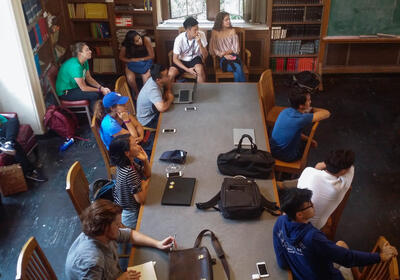 Often the first question on anyone’s mind is a deceptively simple one: “Why?” Why do I have to go to class today? Why do cicadas emerge only once every 17 years? Why am I here?
Often the first question on anyone’s mind is a deceptively simple one: “Why?” Why do I have to go to class today? Why do cicadas emerge only once every 17 years? Why am I here?
Philosophy Berkeley Connect invited faculty to entertain some of these “Why” questions. Of course, they were not able to address all the questions pressing the human mind, but they did explore the question of “Why philosophy?”
Philosophy comes from the Ancient Greek roots “philo” and “sophia,” directly translating to “love of wisdom.” Berkeley Connect faculty director Lara Buchak defined philosophy as truth-seeking. This truth, Buchak specified, is not bound by the scope of a novel or time period but transcends cultures. She explained this to be the distinctive feature of philosophy: universal truth-seeking by rational argument.
This foundational curiosity is what connects philosophers from all backgrounds and times. Buchak and her colleagues Timothy Clarke and Kwong-Ioi Shun each pursued philosophy based on different interests and understandings of the field. For Buchak, philosophy meant questions about God, the meaning of life, and ideal political systems. Clarke’s interest in philosophy was piqued by his first love, history. Shun associated philosophy with everything there was to know: from Confucianism to the theory of relativity. Yet what sustained all three professor’s interest in the subject was the process of philosophical inquiry.
Clarke explained that in academia, one individual will rarely have the chance to make revolutionary breakthroughs concerning the meaning of life. The benefit of studying philosophy is exploring and dissecting questions that are fundamental to what humans think and do.
For students interested in becoming professors, Buchak and Clarke outlined the risks and rewards of attending graduate school. Buchak advised students to seek out research programs that provide monetary support to graduate students. She encouraged students to explore their options, adding, “It’s not bad to try it out and leave if you don’t like it.” For students who don’t intend to pursue a career in academia, Clarke tried to appease their fears about the usefulness of a philosophy degree. He reminded them that “Being a thinker helps you get jobs in whatever market we are in.”
By the end of the panel, students were encouraged and inspired by their professors’ answers to the question, “Why philosophy?”.
posted by Gloria Choi
Berkeley Connect Communications Assistant
